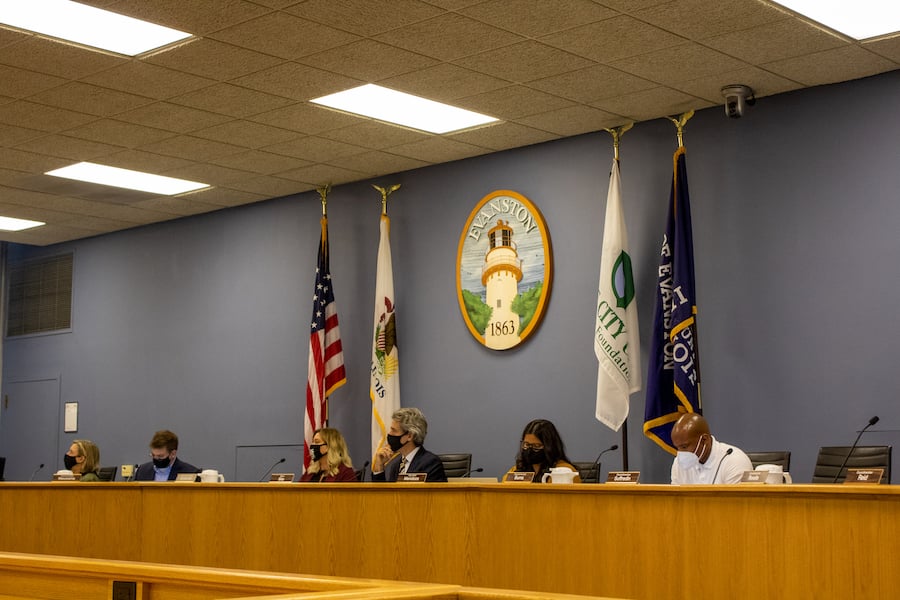Council discusses American Rescue Plan Act funds, CARP allocations
Daily file Photo by Madison Smith
City Council and Mayor Daniel Biss. At a special meeting Monday night, they discussed the city staff’s recommended allocations for the $43 million Evanston received through the American Rescue Plan Act.
October 6, 2021
City Council discussed how to use funds Evanston received from the American Rescue Plan Act Monday night.
City staff have proposed that the largest portion of ARPA-related funding — $11.2 million — should be allocated to “Revenue Loss Funding.” That would include staff restoration and hazard pay for certain city employees who worked essential jobs during the pandemic.
Signed in March by President Joe Biden, ARPA is a $1.9 trillion relief bill extending some COVID-19 stimulus package provisions to foster economic recovery among state, local, territorial and tribal governments.
Evanston will receive $43 million for investments from the package in affordable housing and social services, among other categories.
Ald. Clare Kelly (1st) said the funds for hazard pay are low and should be increased, especially considering the impact of the pandemic on Evanston Fire Department.
“They had to reinvent the way they operated both in the streets and the firehouse,” Kelly said. “We really need to honor those frontline workers and the work they did.”
City staff proposed holding $2.5 million in ARPA funds for participatory budgeting, where a vetted group of community members make decisions on funding based on residents’ priorities.
Community members have called for more input on city financial decisions in recent months, as City Council debated pressing civic matters such as property tax financing, use of other ARPA funds and hiring of a new city manager.
The proposed $3 million allocation to the city’s Water and Sewer Infrastructure budget could further Evanston’s Climate Action & Resilience Plan, city staff wrote in a memo. The plan sets a goal of city carbon neutrality by 2050.
Prior to Monday’s meeting, the Evanston Environment Board’s CARP Implementation Task Force recommended that $5 million in ARPA funding over five years should go toward CARP-centered projects, such as hiring a consultant to carry out the CARP Preliminary Step for Transportation and Mobility.
“The wide spectrum of CARP actions and goals also deserve greater financial support for Evanston’s role in addressing the causes and anticipated impacts of climate change,” Joel Freeman and Lauren Marquez-Viso, co-chairs of the Mayor’s CARP Working Group wrote in a Friday letter to Ald. Bobby Burns (5th).
Evanston Township High School senior and climate change activist Lily Aaron emphasized the important role of environmental justice in CARP goals.
“The intersectionality of the climate crisis has never been more evident as predominantly Black, Indigenous and people of color bear the brunt of storms, fires, floods, heatwaves, food apartheids and droughts,” said Aaron, who is on the board of Citizens’ Greener Evanston and ETown Sunrise. “While there are immediate needs that must be met with ARPA funds, we must not be short-sighted.”
But the federal government doesn’t recognize CARP as a preset ARPA funding category. Interim City Manager Kelly Gandurski said she recommended implementing CARP projects in existing categories.
Ald. Jonathan Nieuwsma (4th) said the city should continue to define CARP funds as a separate entity in a way that is appropriate under ARPA.
“I would feel better if we did explicitly call out the dollar amount for carbon (and) that we are taking that seriously rather than risk losing track of (CARP) in a category,” Nieuwsma said.
Burns pushed for The Council to begin taking action regarding ARPA even while discussions continue about allocation. Mayor Daniel Biss mentioned the possibility of holding additional special meetings dedicated to ARPA, but none have been scheduled.
Correction: A previous version of this story misspelled Ald. Jonathan Nieuwsma’s last name. His last name is spelled Nieuwsma, not Niewsuma. The Daily regrets the error.
Email: jorjasiemons2024@u.northwestern.edu
Twitter: @JorjaSiemons
Related Stories:
— $327 million is now available in statewide utilities assistance. Here’s how you can apply.
— City Council increases FY 2020 budget, evaluates COVID-19 revenue losses
— Pritzker announces $900 million COVID-19 relief grant package



